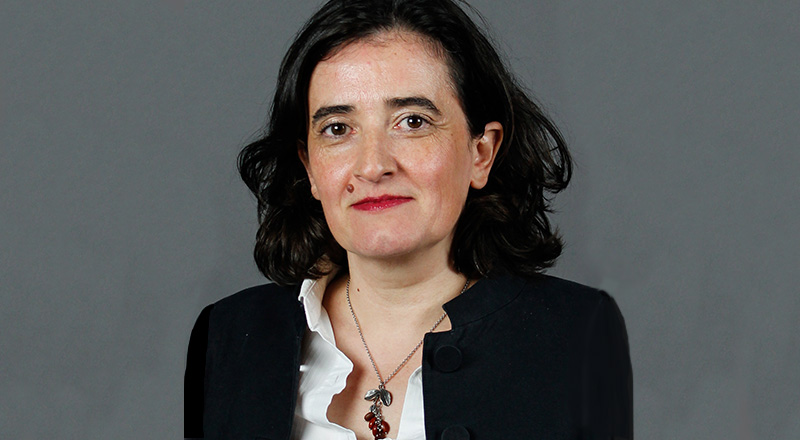Catherine Dubourdieu receives ERC Advanced Grant

Catherine Dubourdieu: The physicist and materials scientist receives the ERC Advanced Grant of 2.5 million euros over five years for her project LUCIOLE. © Materials Research Society USA
Prof. Dr. Catherine Dubourdieu heads the Institute “Functional Oxides for Energy-Efficient Information Technology” at HZB and is Professor at the Physical and Theoretical Chemistry division at Freie Universität Berlin. The physicist and materials scientist specialises in nanometre-sized functional oxides and their applications in information technologies. She has now been awarded a prestigious ERC Advanced Grant for her research project “LUCIOLE”, which aims at combining ferroelectric polar textures with conventional silicon technologies.
With its ERC Advanced Grant format, the European Research Council enables outstanding scientists to conduct pioneering and groundbreaking high-risk research. An ERC Advanced Grant is considered one of the highest awards for experienced researchers.
The project LUCIOLE focuses on ferroelectric nanometer-size oxides, which can host exotic polar textures such as vortices or skyrmions. With a wealth of potential emergent properties, whirling topological polar nanodomains could lead to novel devices, for example ultra-compact memories that store more than a terabyte per square inch. “We want to pave the way to future low power nanoelectronics based on topological defects” says Catherine Dubourdieu.
Monolithically integrated polar textures on silicon will be created and investigated on a nanoscale with state-of-the-art microscopy and spectroscopy techniques. These engineered polarization patterns will be embedded into ultra-scaled devices to study their manipulation and dynamics under electric field.
"We have known about the phenomenon of ferroelectricity for a good hundred years. But it is only in recent years that exotic polar textures have been unveiled. This opens up exciting possibilities for revolutionary new materials and devices. This is definitely the best time to be at the forefront of this field of research," says Dubourdieu.
LUCIOLE: Layering, Understanding, Controlling and Integrating Ferroelectric Polar Textures on Silicon.
News from the ERC
With ERC Grants, the European Research Council supports outstanding scientists who want to implement risky but potentially groundbreaking research ideas. An ERC Advanced Grant is considered one of the highest awards for experienced researchers.
arö
https://www.helmholtz-berlin.de/pubbin/news_seite?nid=24759;sprache=en
- Copy link
-
What Zinc concentration in teeth reveals
Teeth are composites of mineral and protein, with a bulk of bony dentin that is highly porous. This structure is allows teeth to be both strong and sensitive. Besides calcium and phosphate, teeth contain trace elements such as zinc. Using complementary microscopy imaging techniques, a team from Charité Berlin, TU Berlin and HZB has quantified the distribution of natural zinc along and across teeth in 3 dimensions. The team found that, as porosity in dentine increases towards the pulp, zinc concentration increases 5~10 fold. These results help to understand the influence of widely-used zinc-containing biomaterials (e.g. filling) and could inspire improvements in dental medicine.
-
Fascinating archaeological find becomes a source of knowledge
The Bavarian State Office for the Preservation of Historical Monuments (BLfD) has sent a rare artefact from the Middle Bronze Age to Berlin for examination using cutting-edge, non-destructive methods. It is a 3,400-year-old bronze sword, unearthed during archaeological excavations in Nördlingen, Swabia, in 2023. Experts have been able to determine how the hilt and blade are connected, as well as how the rare and well-preserved decorations on the pommel were made. This has provided valuable insight into the craft techniques employed in southern Germany during the Bronze Age. The BLfD used 3D computed tomography and X-ray diffraction to analyse internal stresses at the Helmholtz-Zentrum Berlin (HZB), as well as X-ray fluorescence spectroscopy at a BESSY II beamline supervised by the Bundesanstalt für Materialforschung und -prüfung (BAM).
-
Element cobalt exhibits surprising properties
The element cobalt is considered a typical ferromagnet with no further secrets. However, an international team led by HZB researcher Dr. Jaime Sánchez-Barriga has now uncovered complex topological features in its electronic structure. Spin-resolved measurements of the band structure (spin-ARPES) at BESSY II revealed entangled energy bands that cross each other along extended paths in specific crystallographic directions, even at room temperature. As a result, cobalt can be considered as a highly tunable and unexpectedly rich topological platform, opening new perspectives for exploiting magnetic topological states in future information technologies.
